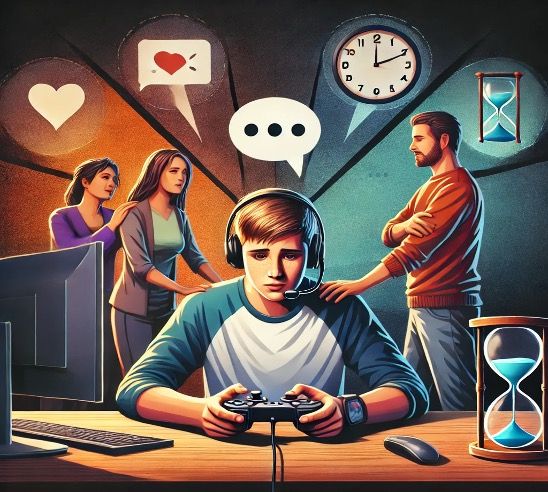The Role of Family in Gaming Disorder
Gaming disorder, classified by the World Health Organization (WHO) in the International Classification of Diseases (ICD-11), is characterised by persistent gaming behavior that leads to significant impairment in personal, social, and family life. Among various contributing factors, family dynamics play a crucial role in both the development and mitigation of gaming disorder among adolescents. Research highlights that family structure, parental involvement, and the quality of parent-child relationships significantly influence gaming behaviours (Fithria et al., 2022; Schneider et al., 2017).

Family Dysfunction and Gaming Disorder
Dysfunctional family environments are often linked to a higher likelihood of developing gaming disorder. A study conducted in Indonesia found that poor communication, lack of affective engagement, and inadequate behavioural control within families were significantly associated with gaming disorder among adolescents (Fithria et al., 2022). In contrast, problem-solving ability and general family functioning did not show a significant correlation with gaming disorder. This suggests that specific aspects of family interaction, particularly emotional support and discipline, are critical in shaping adolescents' gaming behaviors.
Further, Schneider, King, and Delfabbro (2017) emphasise that parent-child relationships play a pivotal role in determining an adolescent’s gaming habits. Adolescents with poor parental relationships are more likely to engage in excessive gaming as a means of escapism. Specifically, warm and supportive parental relationships may serve as a protective factor against problematic gaming, whereas high parental conflict increases the risk.
Parental Influence and Control
Parental supervision and attitudes toward gaming significantly shape adolescent gaming behaviour. Research indicates that restrictive parental supervision, when applied inconsistently, may inadvertently reinforce gaming disorder by increasing parent-child conflicts and fostering secretive gaming habits (She et al., 2022). On the other hand, parental support, characterised by open communication and involvement in a child’s daily activities, has been found to reduce the likelihood of gaming disorder. A longitudinal study by She et al. (2022) found that parental abuse and excessive psychological control were predictive of increased gaming disorder symptoms over time, while parental support acted as a protective factor.
Neuroscientific Perspective on Family and Gaming Disorder
Family relationships also influence brain activity associated with reward processing, which is linked to gaming addiction. Hwang et al. (2020) found that adolescents with gaming disorder exhibited altered brain connectivity in the reward system, which was negatively correlated with family cohesion. This suggests that strong family support may help regulate reward-related behaviours, potentially mitigating the risk of gaming disorder.
Conclusion
The role of family in gaming disorder is multifaceted, with both protective and risk factors influencing adolescent gaming behaviour. Dysfunctional family relationships, excessive parental control, and lack of emotional support contribute to the disorder, whereas warm parental involvement and structured guidance help prevent it. Interventions for gaming disorder should incorporate family-based approaches, emphasizing positive communication and parental support to foster healthier gaming habits.
Resources for Families
Families seeking guidance on gaming disorder can explore the following resources:
- Mindset Erasmus Project – A European initiative addressing gaming disorder and mental health challenges.
- UK Safer Internet Centre – Provides internet safety guidelines and parental controls.
- Common Sense Media – Offers media reviews and parental guides on responsible digital use.
- Internet Matters – Provides expert advice on online gaming safety and parental controls.
- The American Psychiatric Association – Explains gaming disorder from a medical perspective, including symptoms and treatment options.
References
- Fithria, F., Wardani, E., Usman, S., Maulida, R., Darmawati, D., & Husna, C. (2022). The adverse effect of gaming disorder on the family system in society. Open Access Macedonian Journal of Medical Sciences, 10(E), 531-535. https://doi.org/10.3889/oamjms.2022.7249
- Hwang, H., Hong, J., Kim, S. M., & Han, D. H. (2020). The correlation between family relationships and brain activity within the reward circuit in adolescents with internet gaming disorder. Scientific Reports, 10(9951). https://doi.org/10.1038/s41598-020-66535-3
- Schneider, L. A., King, D. L., & Delfabbro, P. H. (2017). Family factors in adolescent problematic Internet gaming: A systematic review. Journal of Behavioral Addictions, 6(3), 321–333. https://doi.org/10.1556/2006.6.2017.035
- She, R., Zhang, Y., & Yang, X. (2022). Parental factors associated with Internet gaming disorder among first-year high school students: Longitudinal study. JMIR Serious Games, 10(4), e33806. https://doi.org/10.2196/33806